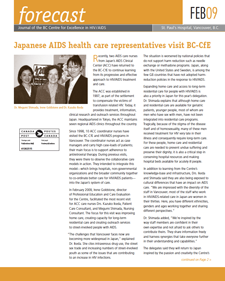Japanese AIDS health care representatives visit BC-CfE
Recently, two AIDS care nurses from Japan’s AIDS Clinical Center (ACC) have returned to the BC-CfE to continue learning from its progressive and effective approach to HIV/AIDS treatment and care.
The ACC was established in 1997, as part of the settlement to compensate the victims of transfusion related HIV. Today, it provides treatment, information, clinical research and outreach services throughout Japan. Headquartered in Tokyo, the ACC maintains seven regional AIDS clinics throughout the country.
Since 1998, 10 ACC coordinator nurses have visited the BC-CfE and HIV/AIDS programs in Vancouver. The coordinator nurses act as case managers and carry high case-loads of patients; their main focus is to support adherence to antiretroviral therapy. During previous visits, they were there to observe the collaborative care models in action. They intended to integrate this model—which brings hospitals, non-governmental organizations and the broader community together to co-ordinate better care for HIV/AIDS patients—into the Japan’s system of care.
In February 2009, Irene Goldstone, director of Professional Education and Care Evaluation for the Centre, facilitated the most recent visit for ACC care nurses Drs. Kazuko Ikeda, Patient Care Consultant, and Megumi Shimada, Nursing Consultant. The focus for this visit was improving home care, creating capacity for long-term residential care and creating outreach services to street-involved people with AIDS.
“The challenges that Vancouver faces now are becoming more widespread in Japan,” explained Dr. Ikeda. She cites intravenous drug use, the street sex trade and increasing numbers of street-involved youth as some of the issues that are contributing to an increase in HIV infections.
The situation is worsened by national policies that do not support harm reduction such as needle exchange or methadone programs. Japan, along with the United States and Sweden, is among the few G8 countries that have not adopted harm-reduction policies in the response to HIV/AIDS.
Expanding home care and access to long-term residential care for people with HIV/AIDS is also a priority in Japan for this year’s delegation. Dr. Shimada explains that although home care and residential care are available for geriatric patients, younger people, most of whom are men who have sex with men, have not been integrated into residential care programs. Tragically, because of the stigma of the disease itself and of homosexuality, many of these men received treatment for HIV very late in their illness and consequently require long-term care. For these people, home care and residential care are needed to prevent undue suffering and preserve their dignity; it is also a critical step in conserving hospital resources and making hospital beds available for acutely ill people.
In addition to learning from the Centre’s knowledge-base and infrastructure, Drs. Ikeda and Shimada said they are also being exposed to cultural differences that have an impact on AIDS care. “We are impressed with the diversity of the staff in Vancouver; most of the staff who work in HIV/AIDS-related care in Japan are women in their thirties. Here, you have different ethnicities, genders and ages working together and sharing different perspectives.”
Dr. Shimada added, “We’re inspired by the way staff members are confident in their own expertise and not afraid to ask others to contribute theirs. They share information freely and harness synergies that take everyone further in their understanding and capabilities.”

